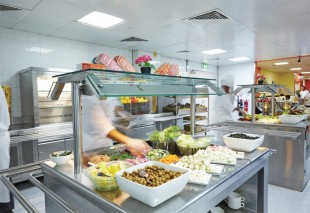

Case study: Staff cafeteria catering

Fairmont Bab Al Bahr recently took over the catering for its staff cafeteria; Caterer Middle East looks at the changes implemented and feedback received
On September 1, 2013, Fairmont Bab Al Bahr executive chef Cladys Magagna took over the staff cafeteria, Makanna, for the entire hotel, a move which Magagna calls one of his proudest moments on the job. Previously managed by an outside catering firm serving more than 1500 meals a day, Magagna is happy to see the operation come under his control, with wholesome meals that take into account the preferences of the multi-cultural team.
RATIONAL AND OBJECTIVE
“Since I joined in September, 2012, I have worked on a lot of new projects. To name a few: the kitchen’s organisational structure, health and safety perspective, the usage of sustainable products (fish and other local items) and the conception of a business plan — not just from a food quality standpoint but taking into consideration the sizeable savings that can be generated from managing the operation alongside creation of a culinary brigade equipped with skills to manage a restaurant or banqueting operation catering of about 1000+ per day,” says Magagna.
His most recent project was to take over the colleagues’ cafeteria.
Explaining why this was necessary, Magagna says: “The objective behind taking over the cafeteria was mainly to improve the quality of food, try to control the expenses and create an engagement with our colleagues as we firmly believe it is an important part of our colleagues’ satisfaction to ensure they have the right food.”
IMPLEMENTATION
The hotel’s F&B team began preparing for this move in advance, so as to ensure everything went according to plan. According to Magagna, the business plan was sent to the management in December 2012.
He explains: “Careful execution was furthered through the recruitment of a team of 11 chefs including a junior sous chef.”
In addition to recruiting a team solely for the staff cafeteria, menus were prepared, and based on the kind of meal preparations on a daily basis, a duty roster was also created.
Magagna also cleverly made use of available space. “We also looked for a space for food storage for the dry store products and since there was no kitchen exclusively for Makanna, the banquet kitchen was utilised during night shifts.”
Article continues on next page ...
IN PRACTICE
Once the preparation was complete, it was time to put it all into action. The staff cafeteria’s official inauguration was on September 1, 2013.
Magagna reveals that that date was heralded as ‘Makanna’s Independence Day’ and this anniversary will be celebrated every year.
He says: “It operates like any other restaurant in the hotel by scheduling breakfast, lunch, dinner and midnight service, and not to mention, the rotation of the menu being offered.”
In addition to kind of food, a sense of camarederie is fostered. He says: “We also focus on respecting the multi-cultural environment of colleagues within the hotel. This is shown in the commemoration on the national days of the various nationalities and special occasions celebrated locally and holidays like Ramadan, Eid, Christmas, and Thanksgiving reflected in the food and the decoration.”
The average number of colleagues per shift is between 350-400, according to Magagna, who explains that covers are predicted on a weekly basis according to a forecasting carried out to ensure there is enough manpower to serve the diners on a regular basis.
FEEDBACK
Magagna says: “We got a far-reaching and positive response from our colleagues who appreciated the initiative of our company to improve the quality of food, quality of life and quality of work, as these initiatives represent the integral part of their benefit as colleagues.”
The changes implemented are not set in stone, however, as Magagna emphasises the importance of feedback and listening to suggestions and constructive criticism.
“We also see that there is more clear communication between Makanna and the colleagues. We are very open for any comments and suggestions on how to further improve our food quality. We always try to listen to feedback on a daily basis as this is extremely important to maintain and improve the quality of food and service.
“Although it is hard to please the multi-ethnicity setting despite of the strategic plan we put into place, we ensured that there will be a specialised chef for most of the cuisines,” he says.
Magagna adds: “The quality of the food is better now! We also pride ourselves on the fact that a Fairmont chef wearing a Fairmont jacket is serving the colleagues in Makanna.”